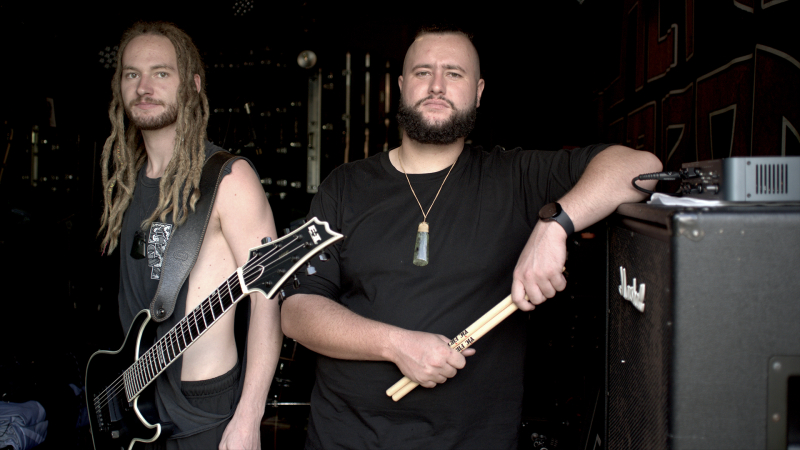
Tribeca Festival
MOVIE REVIEW
Alien Weaponry: Kua Tupu Te Ara (2024)
Any documentary, mock or not, about a band from New Zealand still exists in the shadow of “Flight of the Conchords.” And while it is to be regretted that there are no band meetings in which somebody takes attendance, that’s because “Alien Weaponry: Kua Tupu Te Ara” is telling a very different story to the Tribeca Festival. The duo at the core of the movie, brothers Henry and Lewis De Jong, formed their thrash metal band when they were 10 and 8 years old respectively. Director Kent Belcher’s camera follows them from 2018 to 2023, so when drummer Henry goes from around 18 to 24 and lead singer-guitarist Lewis goes from 16 to his 21st birthday party. What they have achieved at such young ages is astounding, all the more when you learn large portion of their songs are in Māori, the indigenous language of New Zealand. But the global metal scene is large enough to embrace them; and the ways in which they find their place in it are charmingly explored in this surprisingly gentle movie.
The brothers’ parents, Niel and Jette De Jong, could not be more supportive. During their sons’ childhood they facilitated their participation at gigs around the nation, along with their bassist Ethan Trembath, who was recruited in music class at their school. As old home movies make clear, their talent was obvious early on. The band won some major New Zealand music prizes in 2016, and after the release of its first album the entire family (and Ethan) embarked on a major European tour in 2018. At the Wacken Open Air Festival the parents allow 18-year-old Henry to get his first tattoo, which the younger Lewis is very unhappy about, but that sibling squabbling is as bad as things get, at least on camera. Various talking heads from other metal bands, including Lamb of God and Gojira, talk a lot about the risks of the road and the difficulty of working with siblings, but with the exception of a few joints (ooh, naughty) there’s no bad behavior on camera. At one point, Lewis spills a beer, and immediately cleans it up. When they go on their first world tour without their parents both brothers talk about how much they miss them. When Ethan decides he wants to leave the band, he participates fully in recruiting his replacement, Tūranga Morgan-Edmonds. It’s rock and roll, but not as the stereotypes would have it.
The fictional “Kneecap” has a much more raucous tone and a significantly more combative attitude to using their own language in their art, but it also worked hard to contextualize the band’s music and stylistic choices. This documentary goes the other way. Mr. Belcher chose not to translate any of the Māori that appears in the film, including the subtitle, which apparently means “the path has grown.” When Māori rituals do appear – primarily the significant body tattooing Henry and Tūranga have by the end – they are not explained either. This is fair enough for a home audience but considering how much concern is expressed that global success might disconnect them from their heritage, it’s odd. Helping us understand a little more might help them feel more seen. On the other hand, the global kiwi diaspora makes itself felt, such as when the indigenous flag is flown in the audience of a gig in London. The metal scene is significantly more community-focused and supportive than the hip-hop one, but the giant talent shown by these young men makes it clear they would be welcomed regardless of language.
The only trouble is that Mr. Belcher is not a director who brought an angle to the project. As pleasant as it is to hang out with the band, there’s no attempt to probe their ethos, goals, musical choices or personal lives. It’s Niel and Jette who speak a little more, but that’s not necessarily appropriate, as everyone knows no matter how much you love them you don’t tell all your thoughts to your mum and dad. There’s not really anything wrong with that, especially because of how young the band is, but one suspects this movie’s footage will be even more valuable when it eventually comes to making their own “Metallica: Some Kind of Monster.” It’s not that all stories need conflict. But they do need a hook, and unfortunately “Alien Weaponry: Kua Tupu Te Ara” doesn’t quite have enough of one. While it’s a pleasant change to allow the work to speak for itself, the documentary’s worldwide appeal is limited to those who are already keen students of the global metal scene.
Comments